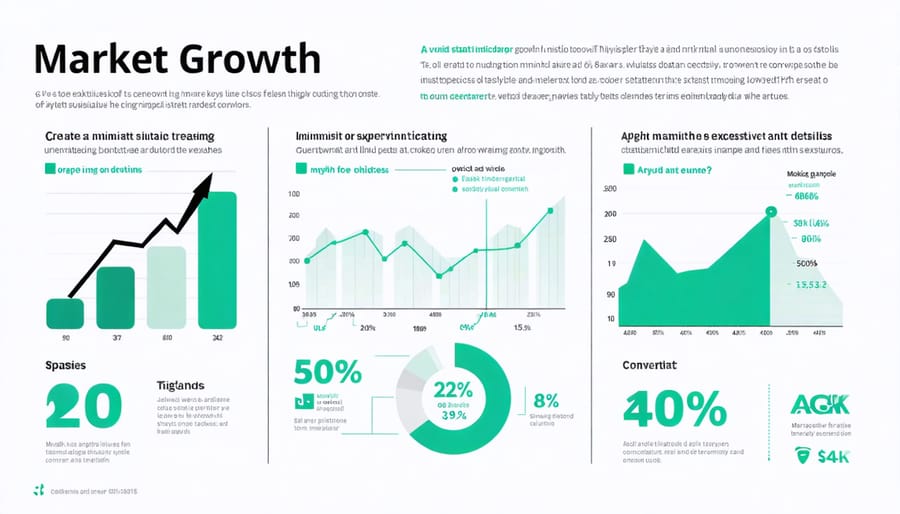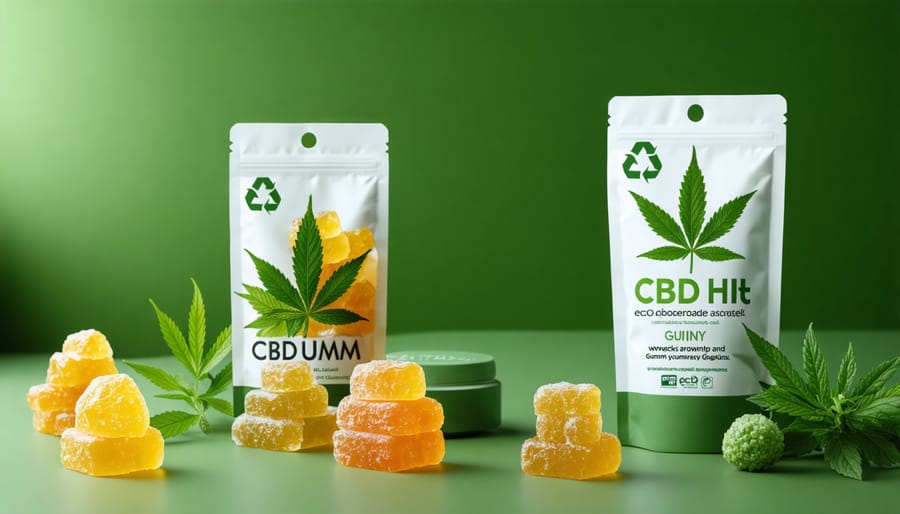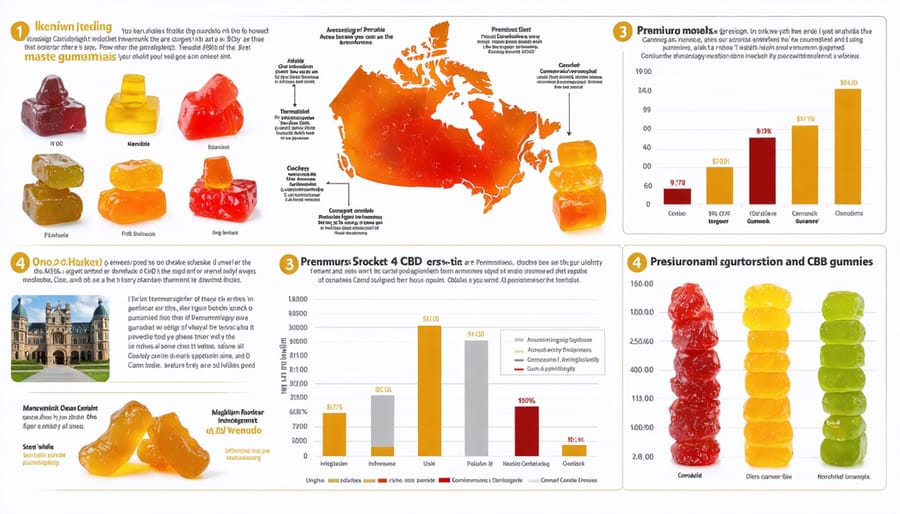Canada’s CBD gummies market has emerged as a powerhouse segment within the cannabis industry, projected to reach CAD 2.1 billion by 2025. As consumers increasingly seek Shop CBDNorth gummies and other wellness-focused alternatives, this rapidly evolving sector presents unprecedented opportunities for business leaders and investors.
Recent market analysis reveals a significant shift in consumer preferences, with 64% of Canadian CBD users now choosing gummies as their preferred consumption method. This transformation is driven by three key factors: stringent quality control standards that position Canadian manufacturers as global leaders, innovative formulation technologies enabling precise dosing and enhanced bioavailability, and growing mainstream retail acceptance.
The convergence of wellness trends and technological advancement has created a unique market dynamic where premium, science-backed products command significant market share. For corporate decision-makers, understanding these evolving patterns is crucial as the industry moves beyond early adoption into a mature market phase characterized by sophisticated consumer demands and regulatory compliance.
This strategic intersection of innovation, consumer behavior, and regulatory framework defines the current state of Canada’s CBD gummies market, setting the stage for unprecedented growth and market transformation.
Market Growth and Economic Impact
Current Market Valuation
The Canadian CBD gummies market has demonstrated remarkable growth, reaching CAD 425 million in 2023, with projections indicating a compound annual growth rate (CAGR) of 16.8% through 2028. This surge aligns with broader cannabis product market trends, reflecting increasing consumer acceptance and market maturation. Recent market analysis reveals that premium CBD gummies command approximately 35% of the total edibles segment, with organic variants experiencing the fastest growth at 22% year-over-year.
Major urban centers, particularly Toronto, Vancouver, and Montreal, account for 65% of total market share, while e-commerce sales have doubled since 2021, now representing 28% of all CBD gummy transactions. The market’s evolution has attracted significant institutional investment, with venture capital funding reaching CAD 180 million in the past 18 months. Notable market leaders have achieved impressive profit margins averaging 42%, primarily driven by product innovation and efficient distribution networks. Consumer demographics show strongest adoption among professionals aged 25-44, who collectively represent 58% of total sales volume.

Investment Landscape
The Canadian CBD gummies market has emerged as a compelling investment opportunity, particularly within the rapidly evolving biotech innovation sector. Investment figures show a remarkable 125% year-over-year growth in venture capital funding, with Toronto and Vancouver leading as primary investment hubs. Angel investors and institutional funds have allocated over CAD 200 million specifically to CBD gummy manufacturers and distributors in 2023, reflecting growing confidence in the market’s potential.
Key investment trends include strategic partnerships between established pharmaceutical companies and CBD startups, vertical integration initiatives, and significant capital flow into automated production facilities. Return on investment metrics indicate that companies focusing on premium, organic CBD gummies are experiencing margins 30% higher than traditional confectionery products.
For investors, the most promising opportunities lie in companies developing proprietary extraction technologies, implementing AI-driven quality control systems, and establishing robust e-commerce platforms. The market’s maturation has also sparked interest from international investors, particularly from European and Asian markets seeking to capitalize on Canada’s established regulatory framework and innovation ecosystem.
Regulatory Evolution and Business Implications
Recent Policy Changes
Health Canada’s recent regulatory updates have significantly impacted the CBD gummies market landscape. In late 2023, the agency implemented stricter labeling requirements, mandating detailed cannabinoid content disclosure and standardized serving size information. These changes aim to enhance consumer safety and product transparency while fostering market credibility.
A notable shift occurred in manufacturing compliance, with new Good Production Practices (GPP) guidelines specifically addressing edible CBD products. Manufacturers must now demonstrate enhanced quality control measures, including regular third-party laboratory testing and improved traceability systems throughout the production process.
Provincial variations in retail regulations continue to evolve, with Ontario and British Columbia leading the way in streamlining distribution channels for CBD edibles. Alberta has introduced a simplified licensing process for retailers, while Quebec maintains more restrictive policies regarding CBD-infused products.
The regulatory framework now accommodates innovative delivery technologies, provided they meet stringent safety standards. This has opened doors for advanced formulation methods while maintaining strict THC content limitations of 0.3% or less.
Importantly, cross-border commerce regulations remain strict, limiting international market access. However, interprovincial trade barriers have been reduced, allowing for more efficient domestic distribution networks. These policy adjustments reflect Canada’s commitment to balancing market growth with consumer protection in the expanding CBD gummies sector.
Business Adaptation Strategies
Canadian CBD gummy manufacturers are developing sophisticated approaches to navigate the complex regulatory landscape while maintaining market competitiveness. Leading companies are implementing dual-track compliance systems that simultaneously address Health Canada requirements and provincial regulations, enabling swift adaptation to regulatory changes.
Many businesses are partnering with legal compliance firms specializing in cannabis regulations, establishing dedicated regulatory affairs departments, and investing in advanced tracking systems. These investments, while initially costly, have proven crucial for sustainable market presence and growth.
Companies like Toronto-based NatureCan Wellness have pioneered an agile compliance framework that allows for rapid product reformulation when regulatory requirements shift. This approach has become a benchmark for the industry, with several mid-sized manufacturers following suit.
Quality assurance protocols are being enhanced through blockchain technology implementation, ensuring transparent supply chain management and compliance documentation. This technological integration has become particularly important as provinces introduce varying requirements for CBD product verification and testing.
Forward-thinking businesses are also adopting modular manufacturing processes that can quickly adapt to new regulatory standards without significant operational disruption. This strategy has proven especially valuable for companies operating across multiple provinces, each with distinct regulatory requirements.
Some manufacturers are establishing regulatory intelligence units that monitor potential policy changes and develop preemptive adaptation strategies, ensuring business continuity and maintaining market share despite regulatory evolution.
Innovation and Product Development
Technology Integration
The integration of advanced technology has revolutionized CBD gummies production in Canada, with manufacturers leveraging automation and precision engineering to maintain consistency and efficiency. Recent CBD oil innovation trends have introduced sophisticated extraction and infusion processes, enabling producers to achieve precise dosing and enhanced bioavailability.
Leading Canadian manufacturers have implemented IoT-enabled monitoring systems that track production parameters in real-time, ensuring adherence to strict manufacturing quality standards. These smart systems facilitate automated quality control checks throughout the production cycle, from ingredient sourcing to final packaging.
Artificial intelligence and machine learning algorithms are now being deployed to optimize formulation processes, predict maintenance needs, and identify potential quality issues before they impact production. Companies like CannaSweet Technologies have reported a 40% increase in production efficiency after implementing AI-driven manufacturing solutions.
Digital twin technology is emerging as a game-changer, allowing manufacturers to simulate and optimize production processes before implementation. This technology has helped reduce waste by 25% while improving product consistency across batches, according to recent industry reports from the Canadian Cannabis Manufacturers Association.

Consumer-Driven Innovation
Canadian consumers are increasingly driving innovation in the CBD gummies market through their evolving preferences and demands. Market research indicates that 73% of consumers prioritize product customization and specific functional benefits, leading manufacturers to develop targeted formulations.
Companies are responding with innovative features such as precise dosing mechanisms, extended-release formulations, and combination products that address multiple wellness needs. Sugar-free and vegan options have emerged as significant market drivers, with natural sweeteners and plant-based ingredients becoming standard offerings.
Flavor innovation remains crucial, with Canadian consumers showing particular interest in locally-inspired profiles such as maple and wild berry variants. Additionally, manufacturers are developing quick-dissolving formats and travel-friendly packaging in response to on-the-go lifestyle demands.
Consumer feedback has also prompted the development of specialized formulations targeting specific needs like sleep support, stress relief, and athletic recovery. This has led to the integration of complementary ingredients such as melatonin, L-theanine, and specialized terpene blends.
Transparency in ingredient sourcing and manufacturing processes has become a key differentiator, with brands implementing QR code systems and blockchain tracking to provide detailed product information. This consumer-driven approach to product development continues to shape the market’s evolution, ensuring products align with Canadian preferences and wellness objectives.
Environmental and Sustainability Initiatives
Eco-Friendly Manufacturing
Canadian CBD gummies manufacturers are increasingly adopting sustainable production practices, recognizing both environmental imperatives and consumer demands. Leading producers have implemented closed-loop manufacturing systems, reducing water consumption by up to 40% compared to traditional methods. These systems integrate advanced filtration technology and water recycling processes, minimizing environmental impact while maintaining product quality.
Energy efficiency stands at the forefront of eco-friendly manufacturing initiatives. Several prominent Canadian facilities have transitioned to renewable energy sources, with solar and wind power now accounting for approximately 30% of their total energy consumption. Smart factory technologies enable precise control over production parameters, optimizing resource utilization while reducing waste.
Packaging innovation plays a crucial role in sustainability efforts. Manufacturers are switching to biodegradable materials and implementing plastic-free alternatives, with hemp-based packaging emerging as a popular choice. This shift has resulted in a 25% reduction in packaging-related waste across the industry.
Waste management protocols have evolved to include organic material recycling, where CBD extraction byproducts are repurposed for agricultural applications. Companies are also implementing AI-driven inventory management systems to prevent overproduction and reduce expired product waste, achieving an average waste reduction of 35% year-over-year.
These sustainable practices not only benefit the environment but also resonate with environmentally conscious consumers, creating a competitive advantage in the growing CBD gummies market.
Packaging Innovation
The Canadian CBD gummies market is witnessing a significant shift towards sustainable packaging solutions, driven by both consumer demand and environmental regulations. Industry leaders are increasingly adopting eco-friendly materials such as hemp-based plastics, recycled glass, and biodegradable containers to minimize environmental impact while maintaining product integrity.
Notable innovations include smart packaging technologies that incorporate QR codes for batch tracking and authenticity verification, addressing both sustainability and compliance requirements. Canadian manufacturers like GreenLeaf Packaging have pioneered compostable pouches that preserve product freshness while decomposing within 180 days in industrial facilities.
A recent industry survey reveals that 73% of Canadian CBD gummy manufacturers plan to transition to fully sustainable packaging by 2025. This transformation extends beyond materials to include minimalist design approaches that reduce waste and optimize shipping efficiency. Companies are also exploring revolutionary solutions such as mycelium-based packaging and plant-based inks for labeling.
The movement towards sustainable packaging has created new partnerships between CBD manufacturers and Canadian packaging innovation firms, fostering a collaborative ecosystem that prioritizes both environmental responsibility and product protection. These initiatives not only support corporate sustainability goals but also resonate with environmentally conscious consumers, creating a competitive advantage in the growing CBD market.

The Canadian CBD gummies market continues to demonstrate robust growth potential, driven by increasing consumer awareness and evolving regulatory frameworks. Key trends indicate a significant shift towards premium, innovative formulations and sustainable packaging solutions, reflecting the maturing market’s sophistication. Industry leaders are increasingly investing in research and development, particularly in bioavailability enhancement and precise dosing technologies.
Looking ahead, the market is projected to experience substantial expansion through 2025, with several factors positioning Canada as a global leader in CBD innovation. The integration of artificial intelligence in production processes and supply chain management is expected to streamline operations and enhance product consistency. Additionally, the emergence of personalized CBD solutions and functional ingredients suggests a move towards more targeted consumer experiences.
Market consolidation appears inevitable as larger pharmaceutical and wellness companies enter the space, potentially leading to improved standardization and quality control measures. However, opportunities for agile startups remain strong, particularly in niche markets and innovative delivery systems.
Sustainability will continue to drive industry evolution, with biodegradable packaging and organic ingredients becoming standard requirements rather than differentiators. The success of market players will increasingly depend on their ability to balance innovation with regulatory compliance while maintaining transparent supply chains and ethical business practices.
As the industry matures, companies that prioritize technological advancement, maintain rigorous quality standards, and demonstrate environmental responsibility will likely emerge as market leaders in this dynamic sector.

